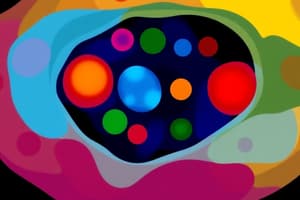Podcast
Questions and Answers
What is the main function of ribosomes in a cell?
What is the main function of ribosomes in a cell?
- Making proteins (correct)
- Storing genetic material
- Transporting molecules
- Producing energy
In terms of cell structure, what is a key difference between prokaryotes and eukaryotes?
In terms of cell structure, what is a key difference between prokaryotes and eukaryotes?
- Method of reproduction
- Type of genetic material
- Having membrane-bound organelles (correct)
- Presence of a cell membrane
Which organelle is responsible for energy production in a cell?
Which organelle is responsible for energy production in a cell?
- Endoplasmic reticulum
- Golgi apparatus
- Nucleus
- Chloroplasts (correct)
What is the function of the Golgi apparatus in a cell?
What is the function of the Golgi apparatus in a cell?
What do plant cells possess that animal cells usually do not?
What do plant cells possess that animal cells usually do not?
Which cellular structure is responsible for maintaining the shape and support of a cell?
Which cellular structure is responsible for maintaining the shape and support of a cell?
What is the primary function of chloroplasts in plant cells?
What is the primary function of chloroplasts in plant cells?
'All living things are made of cells' is a key point in which scientific theory?
'All living things are made of cells' is a key point in which scientific theory?
Flashcards are hidden until you start studying
Study Notes
- The speaker shares memories of exciting science classroom experiences, including observing an amoeba under a microscope.
- Modern cell theory includes three main points: cells are the basic unit of life, all living things are made of cells, and all cells come from pre-existing cells.
- Amoebas are single-celled organisms, while humans are multicellular.
- Prokaryotes (like bacteria) have no nucleus or membrane-bound organelles, while eukaryotes (plants, animals, fungi, protists) have membrane-bound organelles.
- The cell membrane is selectively permeable and keeps the cell stable.
- Cytoplasm is a jelly-like substance found inside the cell, and cells have a cytoskeleton for support and movement.
- Ribosomes, which make proteins, are not membrane-bound organelles.
- In eukaryotes, the nucleus holds genetic material and controls cell activities, and the endoplasmic reticulum processes and transports molecules.
- The Golgi apparatus packages and sorts molecules for secretion or transport to the membrane.
- Mitochondria produce energy in the form of ATP through cellular respiration.
- Plant cells can have additional organelles like chloroplasts, which make glucose through photosynthesis, and a cell wall for protection and shape maintenance.
- Eukaryotic cells have various ways of sending proteins out of the cell, including vesicles from the Golgi apparatus.
Studying That Suits You
Use AI to generate personalized quizzes and flashcards to suit your learning preferences.




